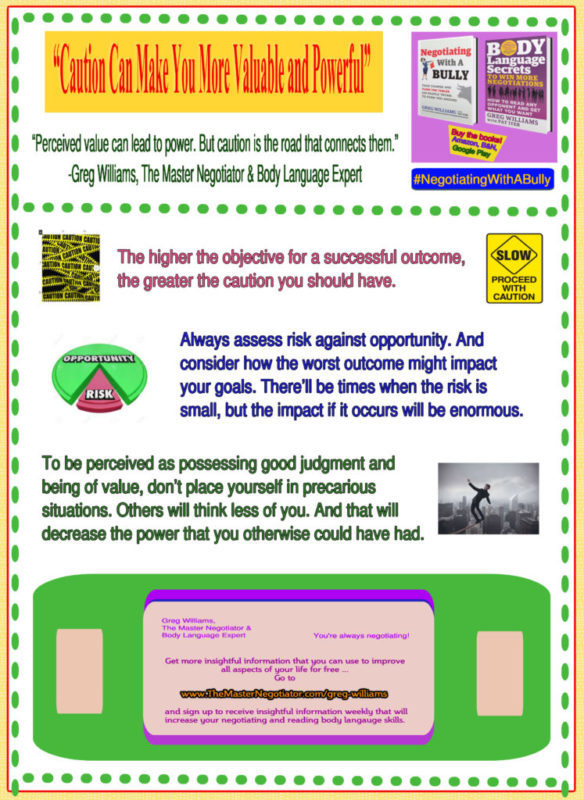“Caution Can Make You More Valuable and Powerful” – Negotiation Insight
“Caution Can Make You More Valuable and Powerful” – Negotiation Insight https://csuiteold.c-suitenetwork.com/advisors/wp-content/themes/csadvisore/images/empty/thumbnail.jpg 150 150 Greg Williams, MN, CSP https://secure.gravatar.com/avatar/1f08a50bcaed92eae0990a65c7808a62?s=96&d=mm&r=g
“Perceived value can lead to power. But caution is what connects them.” -Greg Williams, The Master Negotiator & Body Language Expert (Click to Tweet)

“Caution Can Make You More Valuable and Powerful”
Caution without proper deliberation is nothing more than indecisiveness for lack of direction.
All seven of the members were in a state of confusion. They had differing opinions about what action to take, and they felt time running out. The leader of the group said, we have to proceed with caution. Then, he asked each individual, in private, to state how they arrived at their conclusion.
Finally, he reconvened the meeting. And he emphatically announced the action that the group would take. The power contained in his pronouncement left no ambiguity about his conviction to that action. Everyone looked at him in amazement. That was due to the respect they had for how he’d come to his decision. They viewed him as being more valuable and powerful than he’d been in the past.
What do you consider before making decisions? And, to what degree does caution play a role in your decision-making process? The following are ways you can improve the perception of your power and make yourself more valuable to others.
Caution Versus Haste:
Depending on the circumstances, making hasty decisions can be beneficial. You can say the same about being overly cautious when making decisions, too. But too much caution can cause an opportunity to dissolve before you have the chance to address it. While being hasty can vanish future opportunities that never materialize because of your current haste.
If you have to make impactful choices that will occur in the future, prepare for them sooner than later. Consult knowledge holders that can give sage advice. From that, adopt the most beneficial direction. Then, allow your thoughts to simmer into a more cohesive form of logic. That will dampen emotions from hijacking your thought process.
Seeking Advice – Setting The Stage:
When seeking advice, let those that offer an opinion know that you may not wholly agree with their assessment. And, inform them that their information will have an impact on the final decision. Doing that will make them feel valued.
By framing how you’ll use their input, you set expectations. And, when you set expectations, you shape the boundaries for what might occur. When you do that, it disallows others from legitimately stating they thought something else would happen.
People want you to listen to them – hear them. Let them speak. They’ll perceive themselves as possessing power because they’ll think you thought enough to solicit their opinion. That’ll enhance the value they have of you.
Thus, by seeking their advice, you’ll increase their perspective of the value you have for them, which will bestow that power back to you. It becomes a completed circle. By making others feel good, they’ll feel good about being a source of value.
Caution – be mindful that people view environments based on their outlook. And that will shade how they see the world and the opinions they have. Those variables will impact their thoughts and suggestions.
What does this have to do with negotiations?
First, you have to have a firm understanding of the problem you’re addressing. That means not miscommunicating per how the other negotiator views the situation. As mentioned earlier, you should seek input from those that may add value to the final solution or outcome. When negotiating, that includes the other negotiator, too.
When seeking the process that led to his decisions, understand the mindset that developed those conclusions. If possible, discover his advisors and their mindset, too. Also, assess how you might play to their vanities if they exist. Everyone wants to feel valued. That leads them to believe their more powerful. As it serves your purpose, enhance their feeling by seeking their input. If getting what you want in the negotiation is essential to you, doing that will aid you in achieving a successful negotiation outcome … and everything will be right with the world.
Remember, you’re always negotiating!
Listen to Greg’s podcast at https://anchor.fm/themasternegotiator
After reading this article, what are you thinking? I’d like to know. Reach me at Greg@TheMasterNegotiator.com
To receive Greg’s free “Negotiation Tip of the Week” and the “Sunday Negotiation Insight” click here http://www.themasternegotiator.com/greg-williams/
#Caution #Power #Powerful #Valuable #Negotiate #Negotiator #Business #SmallBusiness #Negotiation #NegotiatingWithABully #Power #Perception #emotionalcontrol #relationships #HowToNegotiateBetter #CSuite #TheMasterNegotiator #ControlEmotions #GregWilliams #Success

